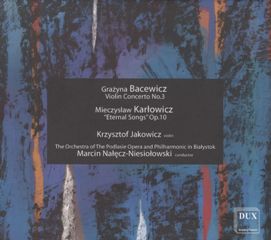Bacewicz: Violin Concerto No. 3; Karlowicz: Eternal Songs, Op. 10 (2010)
Bacewicz: Violin Concerto No. 3; Karlowicz: Eternal Songs, Op. 10 (2010)

Bacewicz - Violin Concerto No. 3 01. - I. Allegro molto moderato [0:08:40.29] 02. - II. Andante [0:07:45.47] 03. - III. Vivo [0:07:46.08] Karlowicz - "Eternal Songs" op.10 Symphonic Poem 04. - I. Piesn o wiekuistej tesknocie [0:11:12.71] 05. - II. Piesn o milosci i o smierci [0:10:57.51] 06. - III. Piesn o wszechbycie [0:05:33.36] Krzysztof Jakowicz - violin The Orchestra of the Podlasie Opera and Philharmonic in Białystok Marcin Nalecz-Niesiolowski – conductor
Grazyna Bacewicz is the most important female Polish composer of the 20th century. Granted, that triple-qualification of "most important" makes it sound like she isn't important at all, but once you've taken to her music, you know that's not true. She was born 100 years ago last February, and in the year since, she's gotten considerable love on record, mostly from Chandos and DUX. She was a prodigious violinist and it is especially her output for that instrument--seven concertos and five sonatas--that receives special attention. Joanna Kurkowicz' excellent recording of three concertos (nos. 1, 3, 7--reviewed for WETA) has probably been the most important Bacewicz release so far.
Dux has also now treated the Third Concerto to an outing, coupled with Mieczys'aw Kar'owicz' Tone Poem Odwieczne pie'ni ("Eternal Songs") op.10 who also had a 100th anniversary last year, albeit that of his death. If you want Kar'owicz' Eternal Songs--delectable stuff and very well performed--there are plenty good choices available including a DUX two-CD set (reviewed here) of 1981/83 radio recordings. Bacewicz's Violin Concerto is the main ingredient here.
Soloist Krzysztof Jakowicz, conductor Marcin Nalecz-Niesiolowski, and The Orchestra of the Podlasie Opera and Philharmonic in Bialystok make the concerto sound like obvious fun. I heard `weltering lyricism and Bartók' in Kurkowicz' recording, but I think Robert Maxham's suggestion (in his Fanfare Magazine review) of trace-elements of Korngold really does a better job of pointing out the liveliness and playfulness of the work. Jakowicz enjoys the work, including spooky figures in the Andante and Vivo (Finale) that seem to howl at the audience like kids in ghost costumes. The first and third movements end on a bang, the finale especially being a headbanging, life-affirming joyous romp designed to show off the soloist in a way that would surely capture and enthrall any live audience.
I'm not sure if a recording (I assume this was a live recording, but there are no noises that give it away as such) should go much further than Jakowicz does, but I know that in performance a much more theatrical way, especially in the first and second movements, would draw in listeners even more; would make an even better point about why we should listen. The writing for violin seems to be an invitation to go over the top--to make it as entertaining as could be. I am reminded of Arabella Steinbacher's Dvo'ák Violin Concerto: superbly tasteful and attractively understated on disc (Pentatone) and riveting-schmaltzy with Colin Davis in concert. I want the latter version for the Bacewicz!
My first reaction to Jakowicz was that he lets his hair down just a little more than Joanna Kurkowicz, and that consequently I enjoyed his performance a little more than the (on the surface of it superior) one on Chandos. But direct comparison suggests it might be the coupling or the headphone listening that was responsible for that impression; the two performances sound eerily similar, with the DUX recording just a few percent slower. The soloists are impeccable, both, and the provincial Bia'ystok orchestra is at no discernable disadvantage to its bigger Polish Radio brethren. One of the few, and minor, differences I detect is a greater amount of control and deliberateness on Kurkowicz' part in the exposed moments of the slow movement... possibly suggestive of why Jakowicz intuitively pushed the `authenticity' button in me.
As an introduction to Kar'owicz and especially Bacewicz this disc is a near-ideal starting point. What I particularly like about it: It made me not just admire the violin concerto, it made me fall in love with it. The only problem--assuming you consider that a problem--is: Once you've quite naturally fallen in love with both pieces, you will end up getting recordings that will double up the repertoire included here. --- Rune Naljoss, amazon.com
download (mp3 @320 kbs):








